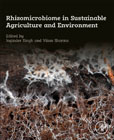
Rhizomicrobiome in Sustainable Agriculture and Environment
Panwar, Joginder Singh
Sharma, Vikas
Rhizomicrobiome in Sustainable Agriculture and Environment explores the important potential of biocontrol agents in the reduction of overexploitation of synthetic pesticides, enhancing crop production, and maintaining the natural texture and health of agricultural soils. As concerns about sustainable production challenge current practices, this book presents opportunities for utilizing biological systems as part of the solution. Written by a team of global experts, sections explore the full range of rhizomicrobiome topics, including sustainable agriculture, food security, and environmental management. This will be a valuable resource for researchers, academics, and advanced students. Rhizomicrobiome is a significant part of plant biological system which impacts the plant growth and survival in different physiological conditions. Its composition includes different microbial networks whose presence is mainly impacted by the root exudates. Archaea, bacteria, protozoa, fungi, oomycetes, nematodes, microarthropods etc. are the significant parts of the rhizomicrobiome. Rhizomicrobiome could be that novel ecosystem housing the bioinoculants that can help create sustainable, productive growth environments. Introduces the latest advancement in the sustainable agricultural practices, microbial biocontrol, and environmental managementPresents the prospects of, wide applications of, traditional uses of, and modern practices of harnessing the potential of rhizomicrobiomeIncludes informative illustrations of recent trends of phyto and soil microbiome INDICE: 1. Rhizomicrobiome: diversity and functional importance 2. Rhizomicrobiome interactions fluxes and its various significance 3. Rhizomicrobiome, characterization and potential applications 4. Tools and technique to explore rhizomicrobiomes 5. Rhizomicrobiome interactions: fundamentals and recent advances 6. Biodiversity and biotechnological applications of rhizomicrobiome for sustainable agriculture and allied sectors 7. Sustainable use of rhizomicrobiome in abiotic stress management 8. Rhizomicrobiome in salinity stress management 9. Rhizomicrobiome: Managing drought stress in plants and its future prospective 10. Impact of pesticides and control measures on rhizomicrobiome 11. Biological control of weeds and their impact on rhizomicrobiome 12. Rhizomicrobiome: Potential applicability on the productivity of food crops 13. Role of rhizomicrobiome in in situ & ex situ conservation of plant community 14. Role and impact of Rhizomicrobiome in plant disease management 15. Rhizomicrobiome as a potential reservoir of heavy metal resistant microorganisms 16. Rhizomicrobiome: Role in management of heavy metal stress in plants 17. Applications of rhizomicrobiome in bioremediation and assisted phytoremediation 18. Rhizomicrobiome as a potential source of microbial inoculants for use in in vitro biotization mediated acclimatization of micro-propagated plants 19. Rhizomicrobiome: Role in biosynthesis of secondary metabolite/bioactive of industrial importance 20. Computational approaches to understand Rhizomicrobiome community and its future implications 21. Role of modern techniques for revealing chemical signatures of rhizomicrobiome 22. Application and Importance of metagenomic studies for exploring rhizomicrobiome dynamics
- ISBN: 978-0-443-23691-4
- Editorial: Academic Press
- Encuadernacion: Rústica
- Páginas: 455
- Fecha Publicación: 01/09/2024
- Nº Volúmenes: 1
- Idioma: Inglés
